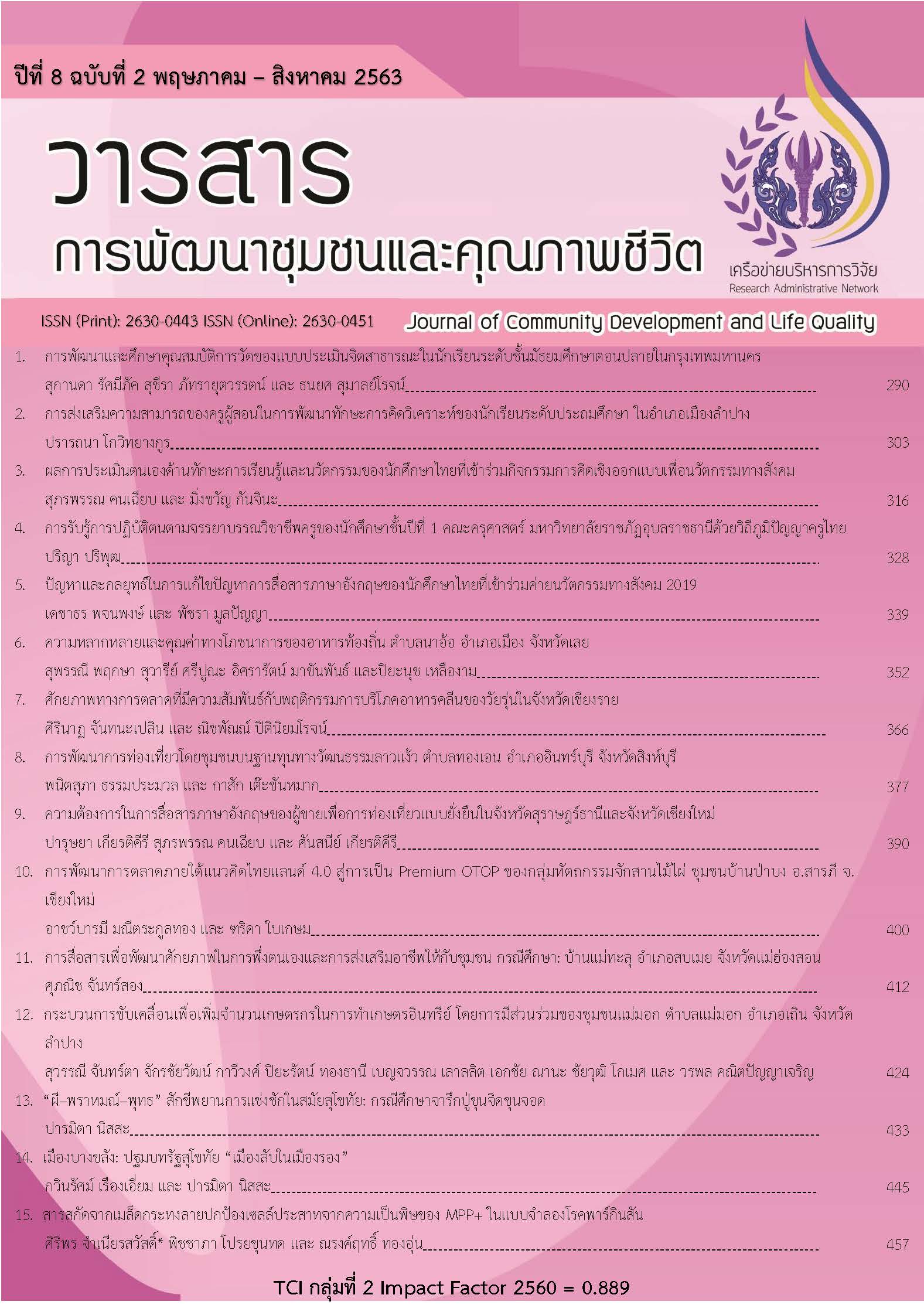การพัฒนาและศึกษาคุณสมบัติการวัดของแบบประเมินจิตสาธารณะ ในนักเรียนระดับชั้นมัธยมศึกษาตอนปลายในกรุงเทพมหานคร
Main Article Content
บทคัดย่อ
การวิจัยครั้งนี้มีวัตถุประสงค์เพื่อพัฒนาและตรวจสอบคุณภาพของแบบประเมินจิตสาธารณะประเภทมาตรประมาณค่าและประเภทเชิงสถานการณ์ในนักเรียนระดับชั้นมัธยมศึกษาตอนปลาย กลุ่มตัวอย่างเป็นนักเรียนที่ศึกษาอยู่ระดับชั้นมัธยมศึกษาตอนปลายในโรงเรียนสังกัดสำนักงานเขตพื้นที่การศึกษามัธยมศึกษากรุงเทพมหานคร จำนวน 479 คน แบ่งเป็น 2 กลุ่ม คือ กลุ่มพัฒนาแบบประเมิน จำนวน 60 คน และกลุ่มตรวจสอบคุณสมบัติการวัด จำนวน 419 คน เครื่องมือที่ใช้ประกอบด้วยแบบประเมินจิตสาธารณะประเภทมาตรประมาณค่าและประเภทเชิงสถานการณ์ที่พัฒนาขึ้นโดยผู้วิจัย ผลการวิจัยพบว่า แบบประเมินจิตสาธารณะทั้ง 2 ประเภทที่พัฒนาขึ้นมีคุณสมบัติการวัดในด้านความตรงและความเที่ยง โดยประเภทมาตรประมาณค่ามีค่า IOC ระหว่าง 0.67 - 1.00 ค่า CITC ระหว่าง 0.30 - 0.62 และค่าสัมประสิทธิ์แอลฟาของคอนบาคเท่ากับ 0.92 ส่วนประเภทเชิงสถานการณ์มีค่า IOC ระหว่าง 0.67 - 1.00 ค่า CITC ระหว่าง 0.33 - 0.74 และค่าสัมประสิทธิ์แอลฟาของคอนบาคเท่ากับ 0.93 นอกจากนี้ ในการวิเคราะห์ความเที่ยงแบบทดสอบคู่ขนานระหว่างแบบประเมินจิตสาธารณะทั้ง 2 ประเภท พบว่า มีความสัมพันธ์เชิงบวกอย่างมีนัยสำคัญทางสถิติที่ระดับ 0.01 โดยสรุป แบบประเมินจิตสาธารณะทั้ง 2 ประเภทมีคุณสมบัติการวัด ซึ่งเหมาะสำหรับนำไปใช้ในการวิจัยที่เกี่ยวข้องกับจิตสาธารณะในนักเรียน
Article Details
กองบรรณาธิการขอสงวนสิทธิ์ในการตรวจและแก้ไขบทความที่เสนอเพื่อตีพิมพ์ในวารสารการพัฒนาชุมชนและคุณภาพชีวิต
บทความหรือข้อความคิดเห็นใด ๆ ที่ปรากฏในวารสารการพัฒนาชุมชนและคุณภาพชีวิต เป็นวรรณกรรมของผู้เขียนโดยเฉพาะคณะผู้จัดทำไม่จำเป็นต้องเห็นด้วย และไม่ใช่ความรับผิดชอบของมหาวิทยาลัยและคณะผู้จัดทำ / บรรณาธิการ
เอกสารอ้างอิง
Chalermrungroj, T. 2016. The relationship between psychological capital and public-mindedness in secondary school students, Hatyaiwitthayalai school. M.Sc. Thesis. Mahidol University, Bangkok. Thailand. (in Thai)
Cristobal, E., C. Flavian and M. Guinaliu. 2007. Perceived e-service quality (PeSQ): Measurement validation and effects on consumer satisfaction and web site loyalty. Managing Service Quality 17(3): 317-340.
Dumprapai, C. 2012. A comparative study on public mind of level III students with different critical thinking ability in South Krungthon School group under Bangkok metropolitan administration. Sripatum Chonburi Journal 9(2): 93-100. (in Thai)
Goodwin, L.D. and N.L. Leech. 2006. Understanding correlation: Factors that affect the size of r. The Journal of Experimental Education 74(3): 249-266.
Hair, J.F., W.C. Black, B.J. Babin and R.E. Anderson. 2010. Multivariate Data Analysis. 7th ed. Upper Saddle River, New Jersey, Prentice Hall. 734 p.
Helms, J.E., K.T. Henze, T.L. Sass and V.A. Mifsud. 2006. Treating Cronbach’s alpha reliability coefficients as data in counseling research. The Counseling Psychologist 34(5): 630-660.
Matchimapiro, D. 2013. The public mind development of Thai youths. Sakon Nakhon Graduate Studies Journal 10(46): 13-23. (in Thai)
Ministry of Education. 2014. Guidelines for Assessing the Moral of Learners (2014 revised version). Agricultural co-operatives federation of Thailand Publisher, Bangkok. 70 p. (in Thai)
Nakrod, C. 2011. Causal factors influencing public mind of Matthayomsuksa II students in Bangkok educational service area III. M.Ed. Thesis. Srinakarinwirot University, Bangkok. (in Thai)
Nooroon, J. 2008. Psychological characteristics affecting public mind of lower secondary school students at Srinakarinwirot university Prasanmit demonstration school (secondary). M.Ed. Thesis. Srinakarinwirot University, Bangkok. (in Thai)
Pakapol, P. and W. Isarangkul Na Ayutthaya. 2015. Effects of project-based learning in social studies subject using service learning activities on public consciousness concepts and behaviors of seventh grade students. Journal of Education Studies 43(1): 80-98. (in Thai)
Panna, K. 2016. Public Minds can be created easily. Chulalongkorn University Press, Bangkok. 341 p. (in Thai)
Phanphonlakrit, N. and C. Sirikulpan. 2017 Factor analysis of ethical mind for vocational students in Chiang Mai Thailand. Journal of Community Development and Life Quality 5(3): 471-479. (in Thai)
Ramsiri, N. 2017. The enhancement of the public mind among lower secondary school students. M.Ed. Thesis. Srinakarinwirot University, Bangkok. (in Thai)
Rovinelli, R.J. and R.K. Hambleton. 1977. On the use of content specialists in the assessment of criterion-referenced test item validity. Dutch Journal of Educational Research 2: 94-60.
Saehum, S. and W. Kaemkate. 2017. Development of a public mind scale for undergraduate students. An Online Journal of Education 12(2): 92-107. (in Thai)
Simatwa, E.M.W. 2010. Piaget's theory of intellectual development and its implication for instructional management at pre-secondary school level. Educational Research and Reviews 5(7): 366-371.
Sutthirat, C. 2012. Teaching Students A Public
Mind. 5th ed. Ve print, Bangkok. 176 p. (in Thai)
Taber, K.S. 2016. The use of Cronbach’s alpha when developing and reporting research instruments in science education. Research in Science Education 48(6): 1273-1296.
Tavakol, M. and R. Dennick. 2011. Making
sense of Cronbach's alpha. International Journal of Medical Education 2011(2): 53-55.
Zhang, Q. and H. Zhao 2017. An analytical overview of Kohlberg’s theory of moral development in college moral education in mainland China. Open Journal of Social Sciences 5(8): 151-160.


